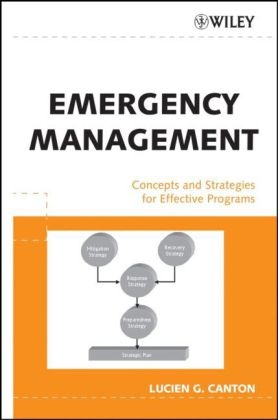Share
Fr. 138.00
Canton, Lucien G Canton, Lucien G. Canton, CANTON LUCIEN G
Emergency Management - Concepts and Strategies for Effective Programs
English · Hardback
Shipping usually within 1 to 3 weeks (not available at short notice)
Description
Zusatztext "...an excellent resource for university and college staff to develop an emergency management program on campus or evaluate an existing program." (Facilities Manager! March/April 2007) Informationen zum Autor LUCIEN G. CANTON! CEM! CBCP! CPP! is an independent consultant specializing in emergency management strategic planning. He is the former director of emergency services for the City of San Francisco! where he coordinated the emergency management program and served as a policy advisor to the mayor on emergency management and homeland security issues. Mr. Canton previously served as an emergency management programs specialist and as a regional hazard mitigation branch chief with the Federal Emergency Management Agency. He is the author of a book on the management of security officers as well as numerous articles on emergency management and security issues. Klappentext An all-hazards! multidisciplinary approach to emergency managementMost emergency management texts focus on the short-term response to specific threats. This book suggests that it is time for a different approach! one that is supported by social science and by new national standards for emergency management programs. This approach is based on the concept that emergency management is a distributed process! one that must be collectively performed by the community. Emergency management must be integrated with other community goals and as such! must be perceived as adding value to the community by helping the community manage overall risk.This community-wide approach also holds implications for the emergency manager. Instead of a technical expert on emergency operations! the emergency manager becomes a program coordinator whose job is to facilitate the development of a community emergency management strategy and oversee its implementation. This focus on strategy allows all the various components of the emergency management program to work together to achieve a common vision of community resilience.The text begins with historical and social science perspectives on emergency management! and then delves into the historical and evolving roles of the emergency manager. Following a broad discussion on establishing an effective emergency management program! the text explores its individual components! including:* Assessing risk* Developing strategies* Planning concepts* Planning techniques and methods* Coordinating response* Managing crisisThroughout the discussion! case studies are used to illustrate both successful and unsuccessful applications of emergency management principles.The need for effective emergency management is clear. This book provides a comprehensive! coordinated approach that is essential for all emergency program managers and anyone tasked with the critical assignment of emergency preparedness and response in either the public or private sector. Zusammenfassung An all-hazards! multidisciplinary approach to emergency managementMost emergency management texts focus on the short-term response to specific threats. This book suggests that it is time for a different approach! one that is supported by social science and by new national standards for emergency management programs. This approach is based on the concept that emergency management is a distributed process! one that must be collectively performed by the community. Emergency management must be integrated with other community goals and as such! must be perceived as adding value to the community by helping the community manage overall risk.This community-wide approach also holds implications for the emergency manager. Instead of a technical expert on emergency operations! the emergency manager becomes a program coordinator whose job is to facilitate the development of a community emergency management strategy and oversee its implementation. This focus on strategy allows all the various components of the eme...
List of contents
Chapter 1. Emergency Management: A Historical Perspective.
Chapter 2. Emergency Management: A Social Science Perspective.
Chapter 3. The Emergency Manager: Evolving Roles and Shifting Paradigms.
Chapter 4. Establishing the Emergency Management Program.
Chapter 5. Assessing Risk.
Chapter 6. Developing Strategy.
Chapter 7. Planning Concepts.
Chapter 8. Planning Techniques and Methods.
Chapter 9. Coordinating Disaster.
Chapter 10. Managing Crisis.
Report
"This book should serve professionals in the emergency management field very well." ( Journal of Hazardous Materials , May 2007)
"...an excellent resource for university and college staff to develop an emergency management program on campus or evaluate an existing program." ( Facilities Manager , March/April 2007)
Product details
| Authors | Canton, Lucien G Canton, Lucien G. Canton, CANTON LUCIEN G |
| Publisher | Wiley, John and Sons Ltd |
| Languages | English |
| Product format | Hardback |
| Released | 27.11.2006 |
| EAN | 9780471734871 |
| ISBN | 978-0-471-73487-1 |
| No. of pages | 368 |
| Subjects |
Natural sciences, medicine, IT, technology
> Chemistry
Social sciences, law, business > Business > Management |
Customer reviews
No reviews have been written for this item yet. Write the first review and be helpful to other users when they decide on a purchase.
Write a review
Thumbs up or thumbs down? Write your own review.

